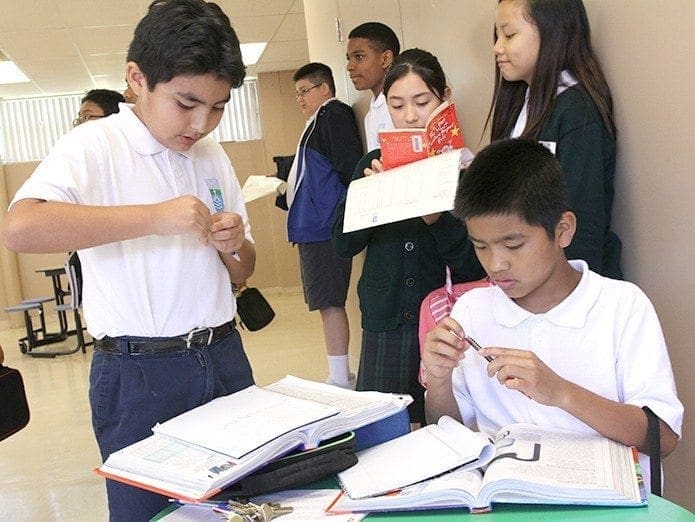 Photo By Michael Alexander
Photo By Michael AlexanderGeneva
School choice for all is human right, Atlanta archbishop tells U.N. body
By CATHOLIC NEWS SERVICE | Published November 30, 2015
GENEVA (CNS)—Amendments to the constitutions of some U.S. states are preventing children from low- and middle-income minority families from better educational opportunities than what may be available in public schools, amounting to discrimination, the archbishop of Atlanta told a U.N. committee meeting in Geneva.
In remarks to the Committee on the Elimination of Racial Discrimination, Archbishop Wilton D. Gregory argued Nov. 24 that the so-called Blaine amendments violate the basic human right to school choice and that nations are required to end all barriers to parental choice in education.
Blaine amendments prohibit the use of state funds at sectarian schools. They are named for Rep. James G. Blaine, R-Maine, who as speaker of the U.S. House of Representatives in 1875 proposed such an amendment to the U.S. Constitution. While the amendment overwhelmingly passed in the House, it failed by four votes in the Senate.
The meeting was part of the U.N. committee’s review of reports filed by the Vatican relating to its performance under the International Convention on the Elimination of All Forms of Racial Discrimination.
Among its provisions, the convention requires signatories to describe steps they have taken to advance the rights of people under the law, including education, and to contest practices that lead to racial discrimination.
Citing his own experience of being educated in Catholic schools, Archbishop Gregory told the committee he enjoyed “life-changing academic and formative opportunities” that “without equal access to public education funding are not available to most low-income families today.”
Prior to the archbishop’s arrival in Geneva, the Atlanta Archdiocese joined the Solidarity Center for Law and Justice, an Atlanta-based human rights law firm in submitting a report examining how Catholic schools generate social capital that helps students overcome obstructions to learning.
The report illustrated how demographic shifts, staffing challenges attributable to the lack of available women religious or men religious to teach in Catholic schools and discriminatory education funding practices interfere with the ability of Catholic schools to build social capital in some of the most impoverished U.S. communities.
Archbishop Gregory acknowledged that the committee cannot dictate state education funding policies. At the same, however, he noted that the committee was “the most accessible and immediate venue within the U.N. treaty system to consider how discriminatory education funding policies interfere with the realization” of the convention to advance equality in law and “combat prejudice which leads to racial discrimination.”
Opponents of school choice have used the Blaine amendments to overturn legislative initiatives to provide state-funded parental choice in education, the archbishop told the committee. He cited a Georgia lawsuit filed by school choice opponents to overturn a popular tax-credit scholarship program that has provided thousands of scholarships to children from low- and middle-income families to attend private schools of their choice since 2008.
Archbishop Gregory urged the committee to take the lead with other human rights treaty committees to monitor how not taking action to repeal or challenge the Blaine amendments or other restrictions on education funding perpetuates practices that disproportionately affect racial and ethnic minorities.
Archbishop Silvano Tomasi, the Vatican observer to U.N. agencies in Geneva, reiterated the Holy See’s support for the convention in a report to the committee Nov. 24.
The Vatican’s adherence to the requirements of the convention, he said, is motivated by church teaching and the belief “that all members of the human race are equal in inherent dignity because their dignity is grounded in the image and likeness of God and the common rational nature shared by all humans as persons.”
He also said that new supplementary norms of the Vatican City State promulgated by Pope Francis July 11, 2013, offer a “very clear and strong piece of legislation for the elimination of racial discrimination and include a punishment of five to 10 years for those guilty of such crimes.”
He cited a section of the norms that prohibit various crimes against humanity, including actions motivated by consideration of race, such as apartheid, persecution and genocide. Such crimes call for prison sentences of 30 to 35 years for people convicted of such crimes, he said.
“Such robust legislation manifests the importance of defending persons from actions that are fueled by racial bias and hatred, with a view to punish the perpetrators of such crimes,” Archbishop Tomasi explained.
“History shows that the truth that all men and women are created equal, with certain inalienable rights, must constantly be reaffirmed, re-appropriated and defended. Such lofty principles should be embodied in social and political life to ensure the elimination of any form of racial discrimination. This moral appeal is universally applicable,” he told the committee.
The archbishop added that the Holy See will continue to advocate globally “the values and all human rights that safeguard the inherent dignity of every person and which are a necessary component for friendly relations among peoples and peace in the world.”
The Convention on the Elimination of All Forms of Racial Discrimination is nearing its 50th anniversary, having been adopted Dec. 21, 1965, by the U.N. General Assembly.